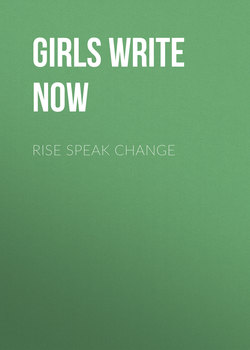Читать книгу Rise Speak Change - Girls Write Now - Страница 30
На сайте Литреса книга снята с продажи.
ОглавлениеAmerica
JANEIN BROOKES
My piece shows the gap between what I believe a writer is and what writing actually means to me.
Sharing a story means having courage. It’s like walking outside naked, breathing in the fresh air and waiting for lightning to strike you. Sharing a story is like experiencing loss. “Kill your darlings”; hinder the process of logical thought. Sharing a story means leaving a piece of yourself in a den of wolves unaware if they will dine on your flesh or press their wet nose to your palm. Sharing a story is like trying to turn on a dead computer. Giving CPR to a corpse that pleads for five more minutes. But we’ve given it five minutes, years, decades, ago and it still lies there like a disease everyone’s too afraid to touch. Sharing a story is saying, “Don’t go through my stuff!” but praying you got to the good part. Sharing a story means metaphorical death.
The transition between extraordinary and illogical.
From the immobile koi fish to the cat sized rats.
The only thing I find impressive about this city we call New
is the language barriers
created because we were once welcoming
to our foreign comrades.
Oh America,
Great America,
land of the self-acclaimed free
who still drink the bitter liquid of poverty
and make money selling Oreos on the beast
underneath our feet.
And we use the white ear plugs of ignorance,
listening to the black man rhyming about his insecurities
crying about the disloyalty of his fifth girlfriend.
Oh America,
great America, why
have you gone and taken
the train of common humanity away?
Being an American means not coming from America at all. It means that after years of my kind being treated as less, I get to learn with others. Being an American means being an outsider to your native land but trading secrets of your past lives. Being an American means identifying oneself by the amount of virtual people who claim to know them. Being American means learning how to weigh the elephant in the room. Being American means to administer those you love to protect the fragile nature of your own affections. Being American means not being American at all.
A man
crawls on the train.
He’s begging for people
to throw miserable pennies in his miserably
empty cup.
He’s begging with his eyes
because he holds the meager
cup between his teeth,
revealing the loss of his leg.
A man
crawls off the train,
his empty cup, still between
his teeth.
Being a writer means that I am the creator of everything. I’m not an artist but art feeds off me like a kid to a goat. I’m not a doctor but the doctor needs me to save his patient and his job. I’m not an explorer but I have named the locations explorers have dared to explore. Being a writer means that I’m nothing.
Music and chatter
holding onto some metal
that is supposed to keep me
stable,
Someone stands back,
an observer to the chaos
of the human mind.
I’m late, I’m lost.
I’ve passed the outside
161st Station,
chaotic and madness
and settled into the maze
of the 42nd Street,
bright and nostalgic.
I’m late, I’m lost.
And now I’m stuck
between the two stops
and I want to go.
I want to see and I want to be.
I’m late, I’m lost.
The Taste
CYNTHIA-MARIE O’BRIEN
Janein’s piece is partly anchored by writing about subway travel, so I wrote this as a foil. I also wanted to give voice to this strong stranger who was rising, speaking, and changing others’ perceptions of her.
Silently, a stranger approached me on the subway platform and offered me a plate of pastries, a plate she had just taken from her bag. The woman presented it to me wordlessly, offering me a fragrant delight. I politely declined, intensely curious as to why she was offering me her food as we waited together in Queens for the Manhattan-bound train. After I declined, she moved along to the other person waiting for the train, a young man, repeating her offer to him, still silent. He, too, turned down the offer, momentarily removing his headphones to do so. As she returned to her seat, I exchanged a puzzled glance with him.
Without hesitation, he looked at me directly and said, “Manners.” Immediately, I felt chagrined. Yes, I thought, manners. It was not long after the president had declared a travel ban on several predominantly Muslim countries, tearing families apart and destroying the hope of many refugees. I had read countless stories covering the chaos: students and doctors prevented from entering the country, or in some cases, from re-entering.
I turned my body toward her, the woman in the hijab. “You’re very kind,” I said.
“Thank you,” she replied. “I’m from Morocco, and in my culture, it’s rude to eat without offering something to others.” She looked like she might cry, might be crying.
“Everyone needs to eat,” I said. The danger of crying seemed to lessen for an instant, if only that.
“Food is a universal need,” I said, awkwardly elaborating.
“Exactly,” she said, and a hint of a smile appeared.
As we waited in the bitter cold for the train, she told me about her aunt, the pastry maker.
The train arrived and separated us again, this time in a sea of people.
I wondered how the pastry tasted. I imagined savoring it, together, on the subway platform.
